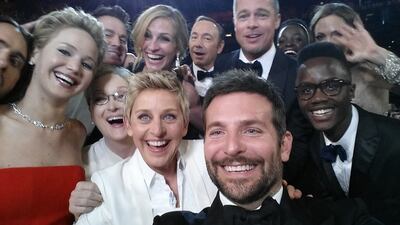In 2014, when comedian Ellen DeGeneres was hosting the Oscars, she took one of the most famous selfies of all time. Live during the ceremony she huddled up with Bradley Cooper, Jennifer Lawrence, Meryl Streep and Julia Roberts, among others, and snapped a shot on her phone. The image became the most retweeted photo to that point in history.
Looking at the picture now, it stands in stark contrast to the current moment for a multitude of reasons. DeGeneres and Kevin Spacey have fallen out of public favour, selfies have lost the novelty they once boasted, and award shows in general now lack the palpable public excitement they once held.
To be clear, I write this as someone who was once obsessed with award shows. There was a time when my friends and I would get together to watch the Oscars, Emmys, Golden Globes and the Grammys, equipped with our detailed list of predictions for the winners. My friends and I don’t do that anymore and I don’t think we’re alone.
I stopped caring, as I'm sure many others did, the day DeGeneres took that selfie. But it wasn't just the selfie – there’s also pizza to consider.

That same night, DeGeneres gave out pizzas to the A-listers in the audience who she imagined were hungry due to the prolonged length of the of ceremony. It was another moment that attempted to humanise the film luminaries in the audience, to show the hundreds of millions watching across the world that these larger-than-life personalities were just like us – they eat pizza and have camera phones.
But instead, it had the opposite effect on me. Injecting everyday life into the ceremony felt desperate, and made these people feel less relevant to everyday life than ever – and less interesting as a result.
The moment reminded me of Amy Poehler's character in the 2004 film Mean Girls as she attempts try to impress her daughter's friends by asserting: "I’m not a regular mum, I’m a cool mum.”
It wasn't just that moment, however. In an era of dwindling viewership and changing consumption habits, award shows have been grappling with how to stay part of the zeitgeist by sweating the small stuff – who should host the show? How can they respond to the seriousness of the political moment while also maintaining the glamour and allure of old Hollywood? How do they appeal to a younger audience while keeping the stature with older generations?
One thing people of all generations don’t respond well to is brand inconstancy. Instead of reaffirming that they’re the authority and source through which to celebrate culture, award ceremonies instead are chasing trends, which has damaged their stature.
Over the last decade everything award shows are supposed to represent – recognising and celebrating the best of art and creatives – has come under scrutiny. They've become associated with elitism, lack of meritocracy, disconnected celebrity culture, predictable outcomes and perpetuating a particular kind of success.
Ricky Gervais who hosted the Golden Globes five times, famously used the platform to mock the ceremony and guests, and while it was good for overnight ratings, it was also instrumental in bolstering the public’s growing disinterest and dislike of celebrities and award shows.
The Golden Globes' previous insistence in rehiring Gervais as host year after year, while entertaining for the public, was also another indicator of how shortsighted they are.
Why constantly invite a guest to your home who throughout dinner taunts and discredits the other guests and your values? If award shows don't take themselves seriously, why should we?

What award shows don’t understand is that viral moments that cross the line from self-deprecating to a lack of self-worth will not ensure loyalty from an already cynical audience. In contrast, it makes them more likely to abandon you.
Award shows need to stop trying to be cool and instead lean into what they are without making apologies for it - an elite ceremony that celebrates art.
This is especially important in a time when the rise of streaming services and social media as a platform for creating stories has resulted in an oversaturation of content. As a result, many things that draw huge audiences get no attention at awards shows at all, leading the awards themselves to be increasingly irrelevant from what they're consuming.
There are so many films, shows, music and creatives that have been left out of public discourse, that haven’t been celebrated as they should have, due to the very narrow way in which award shows preserve what is worthy of recognition and what isn’t.
This, above all else, has been a wake-up call for audiences. We don’t need award shows to tell us what’s good anymore. We can figure it out on our own. And while there is space for award ceremonies to inspire and educate audiences about stories from the plethora of content available, I don’t think they should hold the same gravitas and power they once did. Quite simply, they can't.
There are too many brilliant creatives, too much good content out there – and there’s more to come. No one entity should be responsible for it all – but they should at least broaden their horizons.
Award shows should not disappear, they’re still an important industry event – and that’s what they should focus on: the industry. Their aim shouldn’t be to placate and engage audiences through stunts that mock their own values, but to be a consistent authoritative voice that recognises art and artists.


